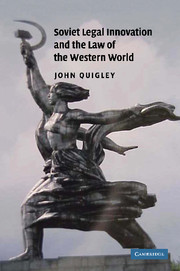Book contents
- Frontmatter
- Contents
- Abbreviations
- Preface
- Acknowledgments
- PART ONE THE SOVIET CHALLENGE
- PART TWO THE WEST ACCOMMODATES
- 8 Panic in the Palace
- 9 Enter the Working Class
- 10 Social Welfare Rights
- 11 The State and the Economy
- 12 Equality Comes to the Family
- 13 Child-Bearing and Rights of Children
- 14 Racial Equality
- 15 Crime and Punishment
- PART THREE THE BOURGEOIS INTERNATIONAL ORDER
- PART FOUR LAW BEYOND THE COLD WAR
- Notes
- Bibliography
- Index
9 - Enter the Working Class
Published online by Cambridge University Press: 27 July 2009
- Frontmatter
- Contents
- Abbreviations
- Preface
- Acknowledgments
- PART ONE THE SOVIET CHALLENGE
- PART TWO THE WEST ACCOMMODATES
- 8 Panic in the Palace
- 9 Enter the Working Class
- 10 Social Welfare Rights
- 11 The State and the Economy
- 12 Equality Comes to the Family
- 13 Child-Bearing and Rights of Children
- 14 Racial Equality
- 15 Crime and Punishment
- PART THREE THE BOURGEOIS INTERNATIONAL ORDER
- PART FOUR LAW BEYOND THE COLD WAR
- Notes
- Bibliography
- Index
Summary
The bolshevik revolution heightened the fear of Marxist ideas. Now the ideas existed not only in the minds of workers; they were being implemented in a major country.
Making the threat seem the more real, war-weary workers in Germany abandoned their factories, marched on the institutions of political power, and brought down the monarchy. In Hungary in March 1919, a government aligned with the Bolsheviks took power. Although it lasted only a few months, it showed the potential impact of Bolshevism elsewhere in Europe. German political parties, including even the social democrats, worked against the revolutionary forces.
“The general postwar atmosphere,” wrote historian John Thompson, “coupled with disquieting examples of military disaffection and social disorder, raised prominently in the minds of Western statesmen the threat of Bolshevism, not only to Russia and Germany, but even to their own countries.” “The spirit of the Bolsheviki is lurking everywhere,” U.S. President Woodrow Wilson confided to a British colleague, “There is grave unrest all over the world.”
Trouble in the United States
The United States was in the throes of concern about domestic Bolshevism. A small but vocal minority within the labor movement regarded the Bolshevik Revolution as a harbinger of America's future. In Seattle in February 1919, in the course of a shipworker strike, local labor organizations declared a general strike and shut down the entire city for several days. May Day demonstrations were large, and in several major cities they turned violent.
- Type
- Chapter
- Information
- Soviet Legal Innovation and the Law of the Western World , pp. 74 - 86Publisher: Cambridge University PressPrint publication year: 2007



